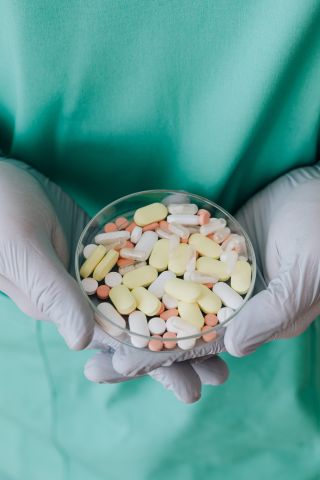Depression
Beyond the Chemical Imbalance Theory of Depression
An Interview with Prof. Joanna Moncrieff
Posted October 8, 2023 Reviewed by Kaja Perina
Key points
- In 2022, a large review led by Joanna Moncrieff showed the ‘serotonin theory of depression’ to be groundless.
- Her review puts into question our reliance on antidepressants to solve mental health problems.
- It also raises philosophical questions about how to break free from psychiatry’s disease model.
About one in 7 people in the UK are on antidepressants. For American college students, that number is closer to one in 5. These numbers are fueled by the widespread belief that depression is caused by a chemical imbalance in the brain – much like diabetes is caused by a hormone imbalance. But what if this idea is completely mistaken, at least in many cases?
In 2022, Joanna Moncrieff, Professor of Critical and Social Psychiatry at University College London and a long-time critic of medical psychiatry, spearheaded a massive review of the existing evidence for the leading biological theory of depression. This is the famed serotonin theory, which claims that an imbalance of brain serotonin causes depression. She and her collaborators found the theory groundless.
I talked with Prof. Moncrieff about her history of advocacy, the future of mental health, and a report that rattled the medical establishment.

Justin Garson (JG): Last year, you co-authored an umbrella review showing that there’s simply no compelling evidence for the serotonin theory of depression. Could you say a word about the nature and scope of your report?
Joanna Moncrieff (JM): The point of an umbrella review is to get an overview of all the research published in an area by assessing the results of all the previous systematic reviews and meta-analyses. It uses the techniques of a systematic review, including systematic searching procedures, data extraction and quality appraisal, but it collates systematic reviews rather than individual studies.
JG: I see. So, the point is to only look at large-scale studies and meta-analyses, and not, say, studies involving small numbers of patients.
The initial reactions to your paper ranged from, “we already knew that the serotonin theory was false,” to “serotonin is one small part of the puzzle but not the whole thing,” to “your paper is harming suffering patients.” Which of the reactions to your paper most surprised you, if any?
JM: I was surprised, first of all, by the level of public interest and then by the defensiveness of the profession. I probably wasn't surprised by them saying, “oh, yes, we already knew that.” And I wasn't surprised by people saying, “oh, it's all more complicated,” because everything's always more complicated [laughs].
I guess none of that was really a surprise, but the level of defensiveness was extraordinary, and the fact that the profession found it quite impossible to be honest with people, that actually these results have major implications for how we think about antidepressants and whether you should be using them.
JG: Let me go right to antidepressants, because that's an obvious motive behind the criticisms. Are you worried at all that people who seem to be benefiting from these pills will stop taking them?
JM: I'm not worried that people will lose the benefits of antidepressants, because I really don't think they have benefits, certainly in the vast majority of cases. And I think that if people are encouraged to look at their feelings in a different way and think about different ways of managing them, that's a good thing, not a bad thing.
What I am worried about is if people stop them very suddenly and precipitate withdrawal symptoms. These are dependence-inducing drugs and can cause severe withdrawals in some people. But I'm not concerned about people wanting to try other ways of managing depression.
JG: As someone who was diagnosed with depression, I agree that exploring different perspectives is valuable. But if antidepressants aren't correcting a chemical imbalance, what exactly are they doing? How do they work?
JM: Well, the first response to that is, I'm not sure they do work, because actually the differences from placebo are marginal. My second response to that is that they do have effects, and one of those effects seems to be numbing emotions, both positive and negative emotions. That may be useful for some people in some circumstances. However, that is not how they’ve been presented to people. I would not object as strongly to antidepressants if they had been presented to people in that way, as long as they are also informed about all their adverse effects, of course.
JG: One common response to your paper has been: look, we always knew serotonin abnormalities were one small part of a larger puzzle, probably involving a complex relation between serotonin and other brain chemicals and adverse life experiences. Aren’t you just presenting a caricature of what a compelling theory would look like?
JM: Saying that depression is caused by serotonin, but also caused by everything else is not a theory [laughs]. That’s the first thing. You need a hypothesis to test. And the serotonin hypothesis was a testable hypothesis.
Prior to the 1990s, people generally thought of depression, in particular, as a reaction to life events. And they thought that taking drugs to modify your mood was generally not a good idea. The pharmaceutical industry set out to change that mindset when they were marketing the SSRIs and SNRIs, with campaigns that told people depression was caused by a chemical imbalance.
My point is, in order to change people's natural inclination to understand moods as a response to what happens to us, it was necessary to tell people that something had been proved or to give the impression that the science was certain or settled.
JG: A few months ago, a paper with over 30 authors argued that your study was flawed, and claimed that it overlooked some crucial studies or otherwise misrepresented the data. For example, they claim that there are tryptophan depletion studies that suggest a role for serotonin in depression, and that you didn’t give those studies their proper weight. How would you respond to those criticisms?
JM: Well first of all, we had already provided a point-by-point rebuttal to this paper at the point at which it was published, although many people were unaware of that fact, because it was difficult to access at the time.
They say that they think the tryptophan depletion studies that we looked at gave a more positive view on serotonin than we had reported. And they say that because we focused on the results in healthy volunteers. The original point of the tryptophan depletion experiments was to see if serotonin depletion can induce depressed mood in people who are not depressed. And everyone agrees that it doesn't do that in healthy volunteers.
Now, some studies conducted with people with depression have found an effect. Where these were included in systematic reviews of the area, we included them in our analysis. But we felt that these were probably not the most important results, partly because they involved small numbers of participants, effects of antidepressants can’t be ruled out, and there’s probably been double counting of studies. So that's why we didn't focus too strongly on these. But we didn't cover it up. It was there in our table of results. So that was their quibble.
JG: You were looking at meta-analyses and large reviews, not individual studies.
JM: Exactly.
JG: In the 1980s, psychiatry came under the grips of a disease-centered paradigm that it hasn't yet broken free from. In my view, part of psychiatry’s breaking free from that paradigm will involve presenting a compelling alternative vision of mental health and healing. In a few words, what’s your alternative vision?
JM: I think we've got to thoroughly demedicalize the whole enterprise of mental health, because I think it does a lot of damage to persuade people that they have a brain abnormality and that they need some chemical or physical intervention to put that right. Which is not to say that I don't think that sometimes when people are acutely psychotic, for example, chemicals can't be helpful in some ways. But telling people they have a brain abnormality, or some physical medical problem, is profoundly disempowering. So, I think we've got to get away from that.
What do we replace it with? In some ways, I think if you can break that down, it doesn't need replacing, because then it will naturally become obvious that most people's problems have to do with social and personal circumstances that need an individual solution. So, there won't be one thing replacing everything that the mental health system is doing at the moment.
JG: One last question. You received your medical degree in 1989, joined the Royal College of Psychiatrists in 1994, and by 1998 helped to form the Critical Psychiatry Network and started to really become a critic of the standard disease-centered paradigm. Was there a turning point for you?
JM: No, I've always been a rebel, I'm afraid [laughs].
JG: It was a pleasure speaking with you. Thanks so much for taking the time.




